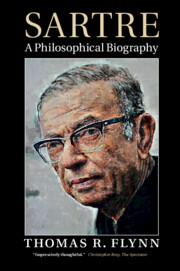Book contents
- Frontmatter
- Dedication
- Contents
- Preface
- Acknowledgments
- Abbreviations
- 1 The childhood of a genius
- 2 An elite education: student, author, soldier, teacher
- 3 Teaching in the lycée, 1931–1939
- 4 First triumph: The Imagination
- 5 Consciousness as imagination
- 6 The necessity of contingency: Nausea
- 7 The war years, 1939–1944
- 8 Bad faith in human life: Being and Nothingness
- 9 Existentialism: the fruit of liberation
- 10 Ends and means: existential ethics
- 11 Means and ends: political existentialism
- 12 A theory of history: Search for a Method
- 13 Individuals and groups: Critique of Dialectical Reason
- 14 A second ethics?
- 15 Existential biography: Flaubert and others
- Conclusion: the Sartrean imaginary, chastened but indomitable
- Select bibliography
- Index
- References
9 - Existentialism: the fruit of liberation
Published online by Cambridge University Press: 18 December 2014
- Frontmatter
- Dedication
- Contents
- Preface
- Acknowledgments
- Abbreviations
- 1 The childhood of a genius
- 2 An elite education: student, author, soldier, teacher
- 3 Teaching in the lycée, 1931–1939
- 4 First triumph: The Imagination
- 5 Consciousness as imagination
- 6 The necessity of contingency: Nausea
- 7 The war years, 1939–1944
- 8 Bad faith in human life: Being and Nothingness
- 9 Existentialism: the fruit of liberation
- 10 Ends and means: existential ethics
- 11 Means and ends: political existentialism
- 12 A theory of history: Search for a Method
- 13 Individuals and groups: Critique of Dialectical Reason
- 14 A second ethics?
- 15 Existential biography: Flaubert and others
- Conclusion: the Sartrean imaginary, chastened but indomitable
- Select bibliography
- Index
- References
Summary
Admitting that “it is not pleasant to be taken for a public monument while one is still alive” (Sitii:43) Sartre nonetheless had to live with gradually becoming an institution in France and around the world. He learned to use his fame to foster various political and social causes. Sartre’s name along with those of Beauvoir and, to a lesser extent, Camus and Merleau-Ponty have come to be associated with the philosophical movement known as “existentialism.” Correctly or not, they and that movement have commonly been identified with the years immediately following the liberation of Paris on the 26th of October 1944. The second half of the 1940s was the period of their emerging celebrity, though Nausea and several short stories (published as The Wall) had introduced Sartre to the literary public by the time he was called to active duty on September 2nd, 1939 and Camus’s The Stranger had appeared in 1941.
But what is this philosophical “school” that bears the label “existentialism”? To start with, it is more an attitude and a manner of living than an abstract, systematic doctrine. As such, one can trace its roots throughout western philosophy at least to Socrates and his notion of philosophy as a way of life (“care of the self”). Indeed, one of Sartre’s critics, Julien Benda, remarked that existentialism “is simply the modern form of an eternal philosophical stance.” And while it is tailor-made for what one of its two nineteenth-century progenitors, Søren Kierkegaard, called “indirect” or “oblique” communication by means of imaginative literature and thus fits quite well a master of the imaginary like Sartre, this scarcely prevented Sartre from producing a systematic existentialist ontology as we observed in Being and Nothingness. That creative tension between the conceptual and the imaginary, the philosophical and the literary which had characterized Sartre’s early thought is now gathered under the rubric of “existentialism.”
- Type
- Chapter
- Information
- SartreA Philosophical Biography, pp. 230 - 261Publisher: Cambridge University PressPrint publication year: 2014



